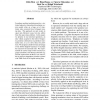Free Online Productivity Tools
i2Speak
i2Symbol
i2OCR
iTex2Img
iWeb2Print
iWeb2Shot
i2Type
iPdf2Split
iPdf2Merge
i2Bopomofo
i2Arabic
i2Style
i2Image
i2PDF
iLatex2Rtf
Sci2ools
128
click to vote
EMNLP
2010
2010
Statistical Machine Translation with a Factorized Grammar
In modern machine translation practice, a statistical phrasal or hierarchical translation system usually relies on a huge set of translation rules extracted from bi-lingual training data. This approach not only results in space and efficiency issues, but also suffers from the sparse data problem. In this paper, we propose to use factorized grammars, an idea widely accepted in the field of linguistic grammar construction, to generalize translation rules, so as to solve these two problems. We designed a method to take advantage of the XTAG English Grammar to facilitate the extraction of factorized rules. We experimented on various setups of low-resource language translation, and showed consistent significant improvement in BLEU over state-ofthe-art string-to-dependency baseline systems with 200K words of bi-lingual training data.
Bi-lingual Training Data | EMNLP 2010 | Modern Machine Translation | Natural Language Processing | Translation Rules |
Related Content
| Added | 11 Feb 2011 |
| Updated | 11 Feb 2011 |
| Type | Journal |
| Year | 2010 |
| Where | EMNLP |
| Authors | Libin Shen, Bing Zhang, Spyros Matsoukas, Jinxi Xu, Ralph M. Weischedel |
Comments (0)

